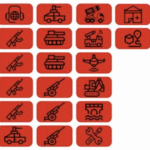“Susskind gives us an easy read… the fascinating section on force doesn’t merely cover the increasing digitisation, automation and privatisation of military activities, but also the serious impacts tech could have on the justice system and all the ways a state enforces law”.
Is it me or is everything right now about fear of the future? Reports of mass migration, climate change, resurgent authoritarian governments, terror attacks, pandemics, and economic ruin seem to preoccupy daily media reports. And then there is the plethora of books; ‘On the Future’, ‘The Future of Capitalism’, ‘The Future of Humanity’ are but some titles released this year.1 We can deduce that the future is much on people’s minds. Of course an obsession with futurity is a characteristically human trait, resulting from a brain with the singular capacity to memorise the past and calculate the future. This brain has propelled the human race onto an exponential trajectory of progress, largely fuelled by scientific discoveries and advances in technology which have seen humanity tackle disease, power and space travel. But as tech has improved our lives, lives have improved tech. Currently, there is much discussion on the growth, abilities, opportunities and risks of rapidly escalating advanced technology. Artificial intelligence, autonomous systems such as driverless cars, self-operating surgical tools and even sex robots are no longer the work of science fiction, but are soon to be everyday realities.
Jamie Susskind, barrister, author and noted wit, (see his wonderful twitter description of a man attempting to hold in a sneeze on the London underground), excavates the issues surrounding the simultaneously exciting and terrifying leap forward in the technological ability of mankind. Future Politics is not merely a discussion of the types of technologies we are likely to see, nor how they might impact us, but crucially, it is about what sort of politics is required in a society so radically changed by these systems. And radically changed we will be. Using references to Marx, Hegel and classical philosophy Susskind addresses our attention to the past to unpack the elements of our political systems which will be fundamentally altered. He powerfully describes the influence of algorithms which have come to store, silo and categorise people according to the secret calculations of private businesses. The world system, and especially military force, is based upon the supreme authority of states and sovereignty. The centrality of the algorithm in contemporary life is not a new concept, Louise Amoore in The Politics of Possibility directed our gaze to algorithmic power back in 2013.2 However, Susskind argues that private tech firms, such as Facebook and Twitter are now accumulating more political capital and power than the state. A future where the dominant political entities of the world are no longer states could be a possibility, and how does a national military operate in an environment like this? What Susskind does is highlight how, and if, political control over technology can be wrestled back before it is too late.
Given the topic, Susskind gives us an easy read separated nicely into easily digestible chapters. The fascinating section on force doesn’t merely cover the increasing digitisation, automation and privatisation of military activities, but also the serious impacts tech could have on the justice system and all the ways a state enforces law. Susskind also talks about how we understand humanity when what is considered human will be fundamentally altered by genetic engineering, biomechanical additions and AI. And the deep inequalities between rich and poor will be exacerbated when only a handful of global elite can afford bio-technologies that could extend life to perhaps 200 years. Tech-enhanced combatants will fortify certain armed forces, or be used by private armies fighting for the highest bidder and, as Susskind reminds us, covered by no regulatory plan. How will a military act in this world? Is war to remain a human endeavour or will robot technology change that? If algorithmic calculation is becoming the key decider of good and bad how can the British military lag so behind in the social media game? This book leads the reader through a myriad of questions, and articulately argues that the answers lie either with early control or being prepared to adapt fast to a radically changed world. Future Politics should be essential reading for those with the will to anticipate the future challenges facing defence and society, and to stare boldly at the sun to offer solutions to one of the most pressing concerns for humanity.
Future Politics: Living Together in a World Transformed by Tech by Jamie Susskind is published by Oxford University Press and it is available here.
The Wavell Team
The Wavell Room team has a host of experience. From the Green Zone in Helmand Province, to the Prairie in Canada, to the smoke filled rooms of Whitehall.
Footnotes
- Rees, Martin. On the Future: Prospects for Humanity, Princeton University Press, 2018. Collier, Paul. The Future of Capitalism: Facing the New Anxieties, Penguin 2018. Kaku, Michio. The Future of Humanity: Transforming Mars, Interstellar Travel, Immortality, and our Destiny Beyond Earth, Penguin Random House, 2018.
- Amoore, Louise. The politics of possibility: Risk and security beyond probability. Duke University Press, 2013.





